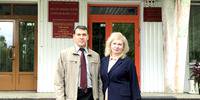The Case of Schitz in Lesosibirsk
Filter
- #
Hakob Stepanyan, an investigator of the investigation department for the city of Lesosibirsk of the Main Investigative Directorate of the Investigative Committee of the Russian Federation for the Krasnoyarsk Territory and the Republic of Khakassia, is initiating a criminal case against 55-year-old Valery Shitz.
He is accused of discussing religious literature, as well as the fact that he "read the prayer of Jehovah's Witnesses."
It follows from the resolution that Shitz, "being in an unidentified place on the territory of the city of Lesosibirsk ... using uninstalled electronic devices... organized and conducted a meeting of an unknown number of adherents of the LRO "Jehovah's Witnesses in Lesosibirsk" through online broadcasts.
- #
Officers of the FSB and the Investigative Committee invade the homes of six residents of Lesosibirsk. Electronic devices, information carriers, and Bibles are seized from believers. In some cases, law enforcement officers take photos and videos. After the searches, Valery Shitz and several other believers were taken for interrogation, after which they were released.
- #
Judge of the Lesosibirsk City Court of the Krasnoyarsk Territory Alexei Knyazev chooses Valery Shitz a measure of restraint in the form of a ban on certain actions: he is forbidden to communicate with persons who are not close relatives and witnesses in a criminal case, as well as to use means of communication and leave the city of Lesosibirsk.
- #
Investigator Stepanyan charges Shitz under Part 1 of Article 282.2 of the Criminal Code of the Russian Federation - organizing the activities of an organization recognized as extremist. The decision to bring the believer as an accused states: "In order to increase the impact on the consciousness of the participants in the online meeting, V. F. Shitz reproduced, interpreted and commented on religious texts."
- #
A new indictment order is issued.
- #
The defense file a motion to terminate the criminal case.
- #
The case is submitted to the Lesosibirsk City Court of the Krasnoyarsk Territory. It will be considered by judge Yevgeny Rafalsky.
- #
Valery Shitz declares that he does not agree with the charges and pleads not guilty. He reads out his attitude to the charges.
In connection with the absence of prosecution witnesses, the court begins an examination of the case materials.
More than 20 people come to support Valery, but only three are allowed into the courtroom.
- #
The Court continues to consider volumes of the case file.
The state prosecutor asks the court to consider a copy of the sentence handed down earlier to another believer from Novosibirsk, Andrey Stupnikov, attached to the case. The lawyer objects that this document does not apply to the case of Valery Schitz. Nevertheless, the court announces it.
- #
The materials of the 4th volume of the case are examined: video recordings, including a conversation between a believer and a woman who is interested in the Bible. The video shows the appearance and behavior of Jehovah's Witnesses at worship meetings. A video of the worship service is also viewed. The prosecutor asks to rewind some frames, but the lawyer draws the court's attention to the fact that it is necessary to review all the material so as not to deprive the process of objectivity.
- #
The study of the case materials, including recordings of worship services via video conferencing, continues. The lawyer draws the court's attention to the fact that the organizer and one of the participants in the video conference have not been identified and interrogated, this information is not in the case file, and the content of the memorandum certificates, which were examined by the prosecutor at the last meeting, does not correspond to what is on the discs under study. The lawyer plans to file a motion to declare the evidence inadmissible.
Earlier, a motion was also filed on the groundlessness of the charge.
- #
The court examines the materials of the case. Videos of worship services are viewed.
At one of the hearings, the court reads out a letter received to him. The letter states that Jehovah's Witnesses are peaceful Christians living all over the world. It also gives a positive characterization of the defendant as a responsible citizen and a loving family man. The authors of the letter ask the court not to punish Valery Shitz for his Christian beliefs and faith in Jehovah God. The judge attaches the letter to the case file.
- #
Interrogation of a secret witness under the pseudonym Ivanov. The judge, having taken a list of questions from each of the parties to the proceedings, retires with the secretary to the next room, where he interrogates the witness independently. The judge then reads out his answers. According to them, it becomes clear that the secret witness had previously attended services of Jehovah's Witnesses.
- #
Interrogation of the second secret witness under the pseudonym Fedorov. His interrogation is also conducted by the judge in person in another room.
From Fedorov's answers, read out by the judge, it becomes clear that he once attended services of Jehovah's Witnesses.
He informs the court that he does not know Valery Shitz and has never attended a Jehovah's Witnesses service in Lesosibirsk.
According to the defense, the testimony of the secret witness was made "as a carbon copy" with the testimony of secret witnesses in similar cases of Jehovah's Witnesses in the Krasnoyarsk Territory. The defense also claims a violation of the right to interrogate a witness, which contradicts the principle of adversarial parties.
- #
Religious scholar Grigory Illarionov is being interrogated via videoconference. The prosecutor asks him to describe in detail the activities of Jehovah's Witnesses. The defense asks its questions.
Then the prosecutor reads out excerpts from the phonetic examination of the recording of Valery Schitz's voice. At this point, the prosecution concludes the presentation of its evidence.
- #
